Pharmko’s IVIG infusion services
Comprehensive Care in Diverse Settings
Pharmko’s IVIG infusion services stand at the forefront of immune therapy, offering personalized and versatile treatment options tailored to individual patient needs. Whether through home infusions, outpatient clinics, or specialized centers, Pharmko ensures safe, effective, and convenient care for those managing immunodeficiency or autoimmune conditions.
Variety of Settings for IVIG Infusions
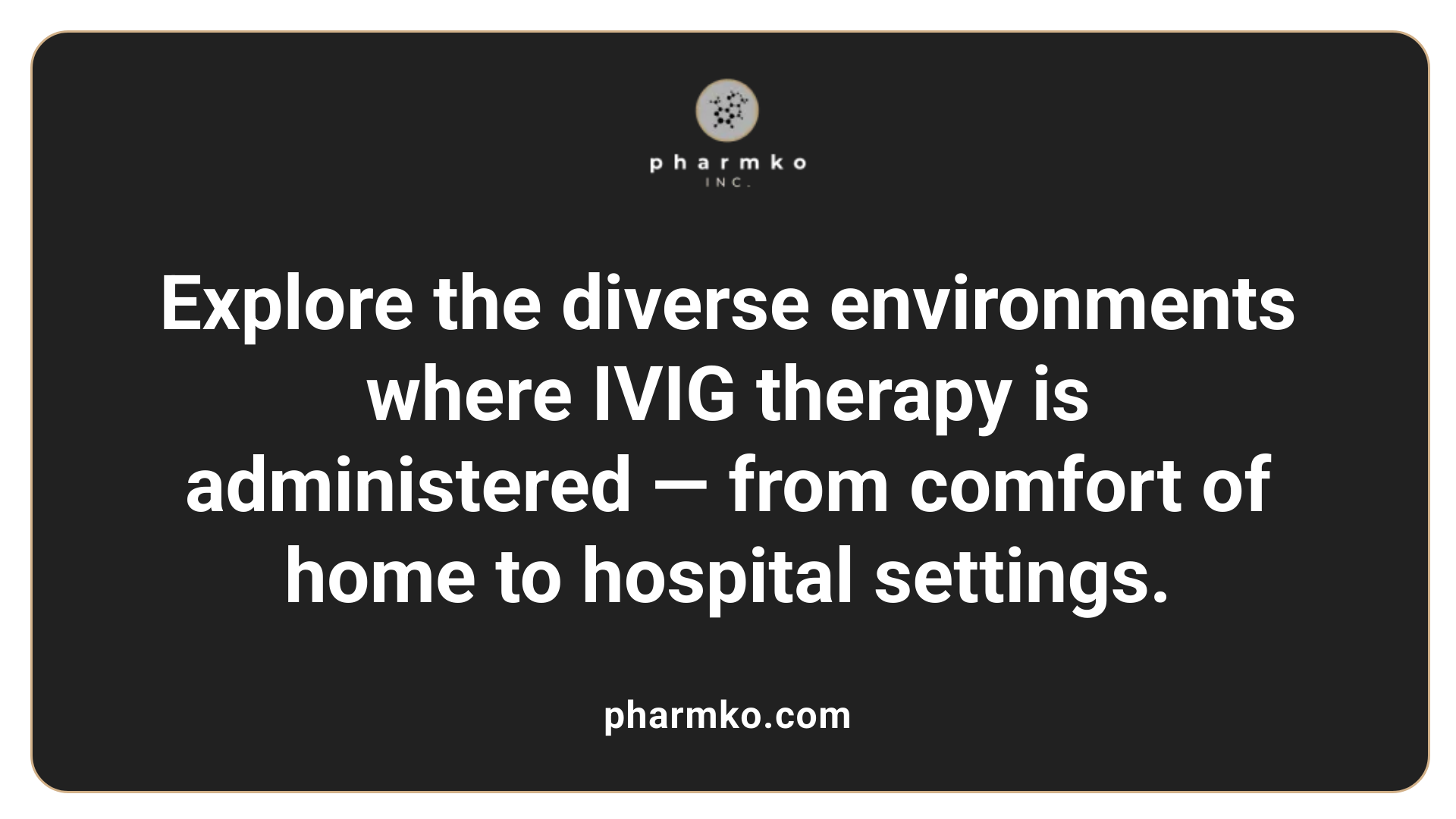 IVIG infusions are versatile and can be administered in multiple environments based on patient needs and healthcare guidance. Patients have options that include receiving treatment at home, outpatient clinics, or hospital settings.
IVIG infusions are versatile and can be administered in multiple environments based on patient needs and healthcare guidance. Patients have options that include receiving treatment at home, outpatient clinics, or hospital settings.
Home infusions offer the convenience of professional nursing support right in the patient’s residence. Companies such as Option Care Health and AmeriPharma® provide specialized nurses who manage the infusion process, monitor for adverse reactions, and assist with educating patients on self-care if necessary. These services often include personalized treatment plans, full coordination with insurance, and round-the-clock support.
Outpatient infusion suites and clinics serve as dedicated spaces for administering IVIG therapy. These centers are equipped with trained staff and resources to closely monitor patients during and after infusions. They are ideal for those who prefer not to have infusions at home or require a setting where immediate medical assistance is readily available.
Hospital-based infusions are typically reserved for complex cases or when patients are at higher risk of adverse reactions. Hospitals provide an environment with immediate access to emergency care, special monitoring equipment, and specialists on hand. This setting is suitable when ongoing supervision or managing severe reactions is necessary.
Here is a comparison of common IVIG infusion settings:
| Setting | Description | Advantages | Suitable for |
|---|---|---|---|
| Home Infusion | Trained nurses administer therapy in the patient’s home | Comfort, convenience, personalized care | Stable patients, those needing frequent infusions, or preference for home care |
| Outpatient Suites | Specialized clinics or infusion centers | Close monitoring, access to emergency resources | Patients who prefer clinic setting or need regular supervision |
| Hospital | Inpatient or outpatient hospital units | Immediate emergency response, high-level monitoring | High-risk patients, severe reactions, complex cases |
Choosing the appropriate setting involves evaluating patient health status, potential risks, and therapy requirements. Ensuring that highly trained healthcare providers supervise all infusions is vital for safety and effective treatment, whether at home or in a medical facility.
Administration and Treatment Process of IVIG Therapy
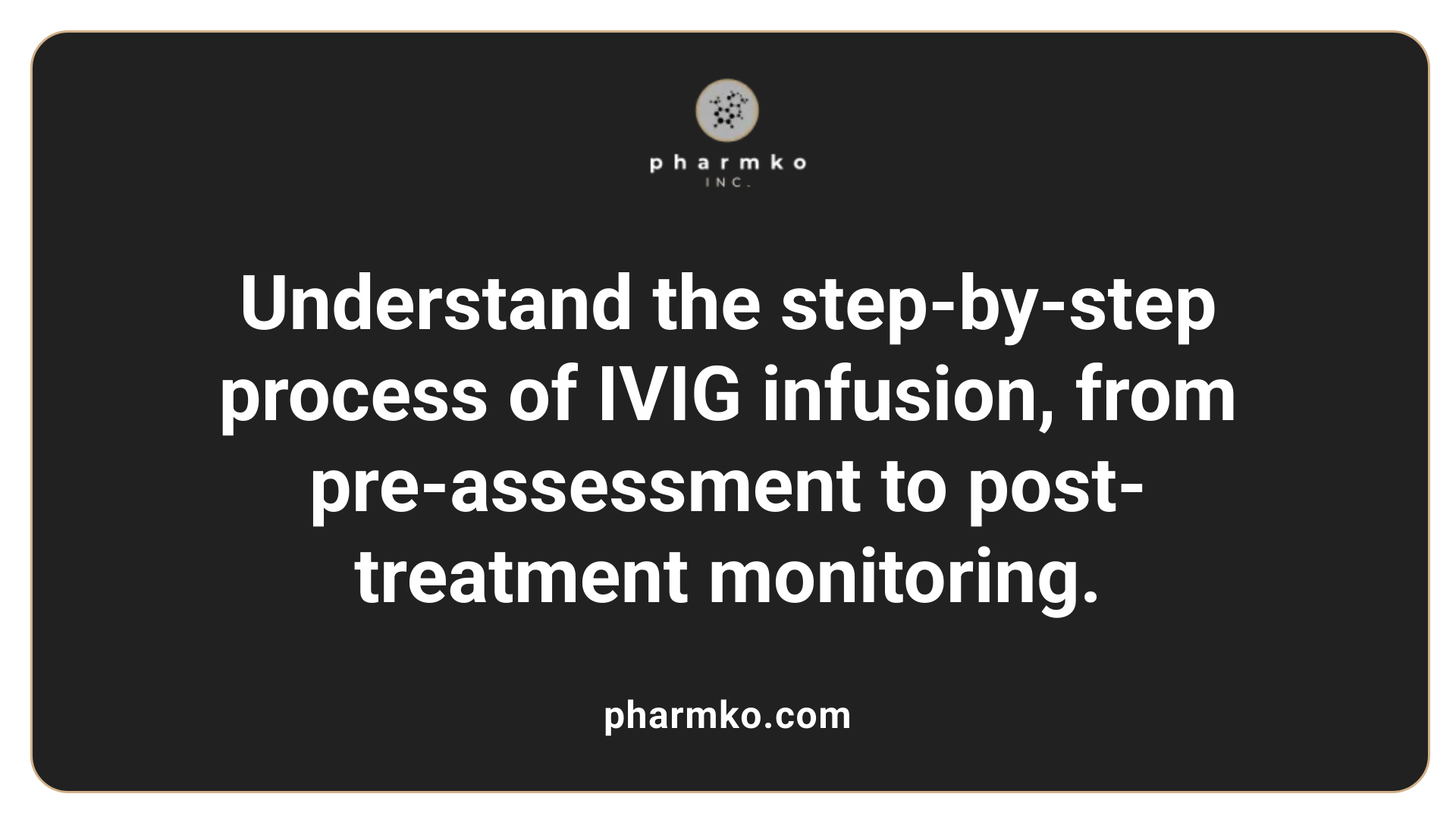
How is IVIG therapy administered and what does the treatment process involve?
IVIG therapy is typically given through intravenous infusion, meaning the medication is delivered directly into a vein using a needle and IV line. The procedure usually lasts between 2 to 4 hours per session.
A trained healthcare professional carefully inserts the IV needle into a vein in the arm. Once the line is set up, the immunoglobulin antibodies are infused slowly. The rate of infusion can be adjusted based on how the patient responds and the specific treatment plan.
Patients often receive IVIG in cycles—such as once a month or every few weeks—depending on their medical condition. These treatments can be administered in various settings: at home, in medical infusion suites, or specialized clinics.
Before starting IVIG therapy, patients typically undergo assessments like blood tests or other evaluations to ensure safety and determine the appropriate dosage. Pre-medication such as antihistamines or acetaminophen might also be given to minimize mild side effects like nausea, headache, or fever.
Monitoring during the infusion is critical. Healthcare providers keep an eye on vital signs and watch for any adverse reactions. After the infusion, patients are observed for a period to ensure they have tolerated the treatment well.
While most side effects are mild and manageable, reactions like allergic responses or infusion-related discomfort do occur in some cases. The frequency and length of treatment sessions depend on individual health needs, aiming to gradually achieve the desired therapeutic effect over time.
Overall, IVIG therapy is a carefully managed process that involves thorough patient assessments, precise administration, and ongoing monitoring to ensure safety and effectiveness.
Preparing for IVIG and Managing Therapy
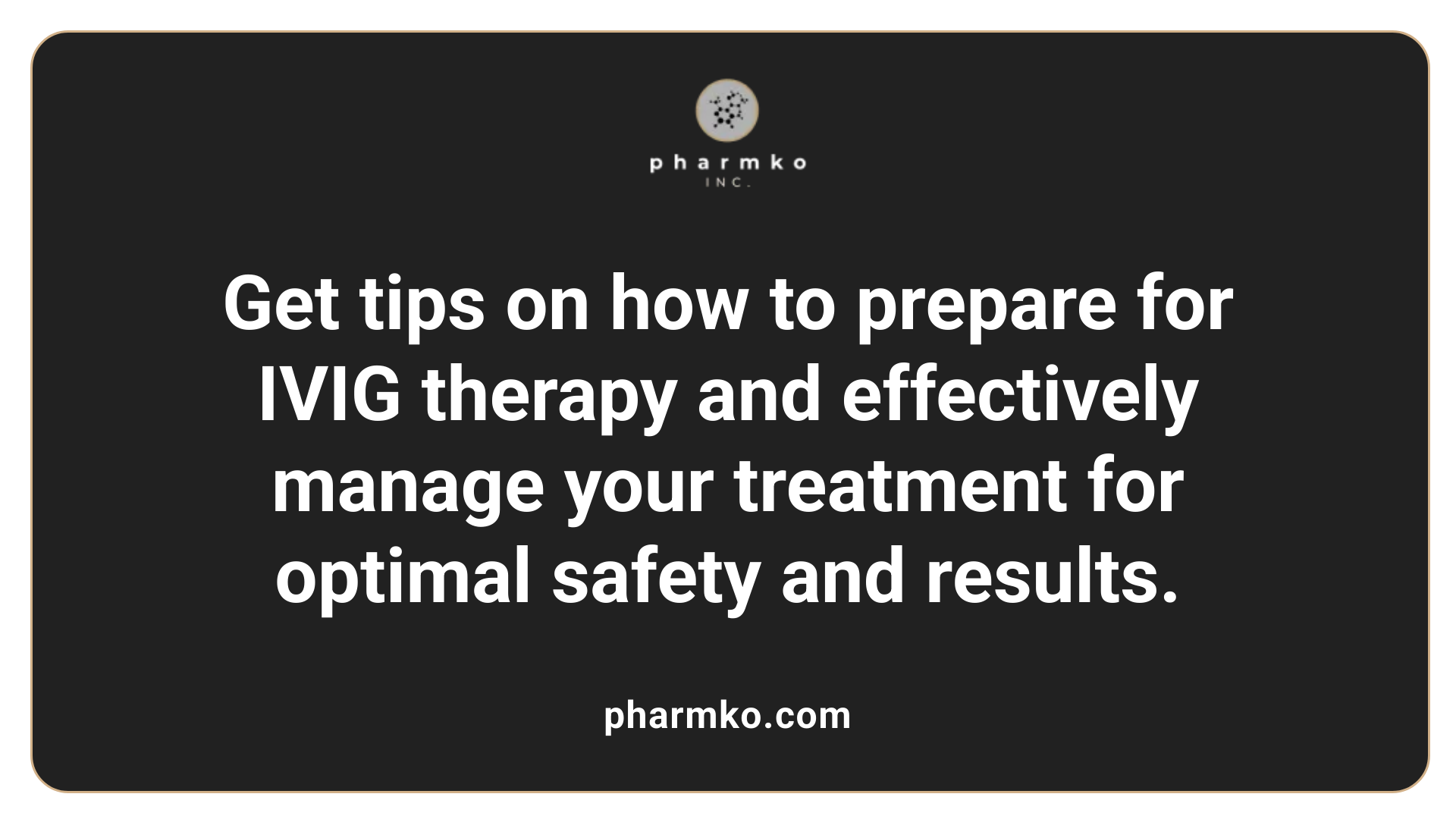
How can patients prepare for IVIG therapy and what management strategies are involved?
Preparing for intravenous immunoglobulin (IVIG) therapy involves several proactive steps to ensure safety and effectiveness. Patients are advised to stay well-hydrated prior to their treatment, as proper hydration can help reduce the risk of side effects such as headaches or kidney issues.
It's important for patients to inform their healthcare providers of any allergies, especially to medications, blood products, or trace elements. Patients should also disclose any current infections or underlying medical conditions like kidney problems or heart disease, as these can influence treatment plans.
Prior to infusion, healthcare providers often perform blood tests or health assessments to gauge overall health status and confirm suitability for IVIG therapy. In some cases, premedication with medications such as acetaminophen, NSAIDs, or steroids may be recommended. These medications help minimize common side effects like fever, chills, or allergic reactions during or following the infusion.
During the infusion, close monitoring by trained healthcare professionals is essential. Patients are encouraged to immediately communicate any discomfort, allergic symptoms, or adverse reactions, including chest pain, difficulty breathing, or severe headache.
Scheduling plays a vital role in effective therapy management. IVIG treatments are typically administered every few weeks, either in medical facilities or at home if supported by trained nurses or infusion teams. Patients should also ensure all necessary documentation for insurance reimbursement and medical records is completed and up-to-date.
Overall, proper preparation and vigilant management can lead to a smooth and successful IVIG therapy experience, helping provide the maximum benefit while minimizing potential risks.
Benefits, Safety, and Monitoring of IVIG Therapy
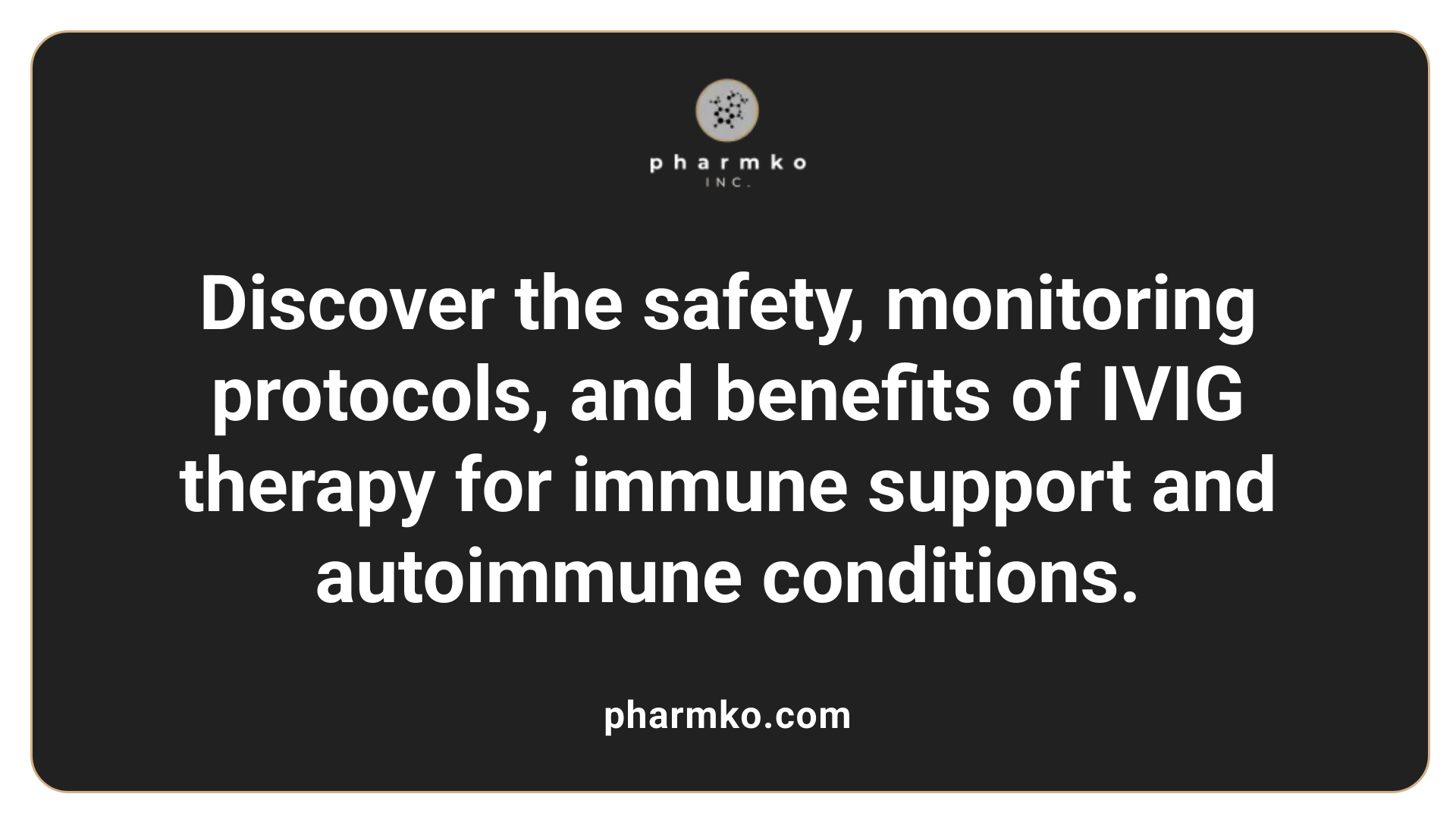
What are the general benefits and safety considerations of IVIG therapy?
IVIG (Intravenous Immunoglobulin) therapy is a valuable treatment option for a range of immune-related conditions. Its primary benefit is strengthening the immune system, which helps prevent infections in individuals with primary immunodeficiency disorders. Additionally, IVIG can reduce inflammation and modulate immune activity, making it effective for autoimmune diseases such as Kawasaki disease, CIDP, and lupus.
Patients receiving IVIG typically experience a marked improvement in their health status, with fewer infections and decreased disease activity. The treatment is generally safe and well-tolerated, with most side effects being mild and manageable.
Common mild side effects include headaches, nausea, muscle aches, and flushing. These symptoms often resolve quickly or can be minimized by premedication or adjusting the infusion rate.
Serious adverse reactions, such as allergic responses, kidney impairment, or blood clots, are very rare but require prompt medical attention. To ensure safety, infusion centers and home care providers follow strict protocols, including patient assessment and monitoring during and after infusions.
Monitoring involves regular blood tests to check IgG levels, kidney function, and detecting any adverse reactions early. Experienced healthcare teams, including specialized infusion nurses and pharmacists, oversee the process, ensuring optimal dosing and response.
Overall, IVIG is considered a safe and effective therapy that enhances immune defenses and manages autoimmune conditions effectively. Its favorable safety profile, combined with comprehensive monitoring, makes it a preferred choice for many patients needing immune support.
Qualified Personnel and Conditions Treated with IVIG
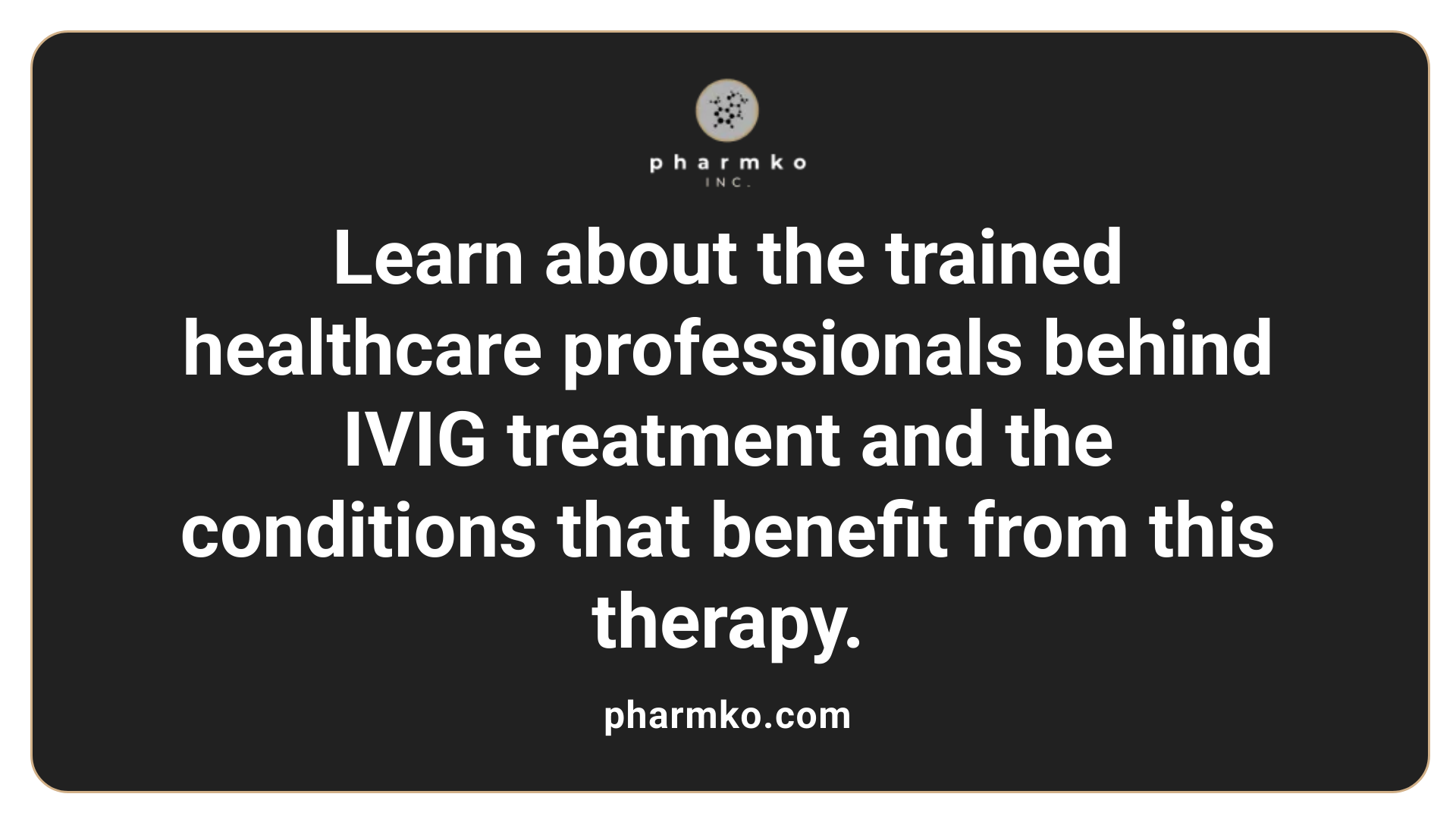 Who can administer IVIG
Who can administer IVIG
Administering IVIG infusions requires specialized knowledge and training, usually performed by qualified healthcare professionals. Registered nurses, licensed practical nurses, and other licensed healthcare providers with proper infusion training are typically responsible for delivering these treatments.
These professionals are trained to prepare IVIG medications, follow strict protocols for infusion, and monitor patients closely throughout the process. They are also skilled in recognizing and managing potential adverse reactions—including allergic responses or infusion-related issues—that may arise during treatment.
In outpatient clinics or home settings, the training can extend to patients or their caregivers. Provided that they demonstrate the competence and understanding of infusion procedures, they may be trained to administer their own IVIG infusions. This process involves comprehensive education on preparation, infusion techniques, connecting and disconnecting tubing, and proper disposal of supplies.
Ensuring safety during IVIG therapy depends heavily on adherence to guidelines, sterile techniques, and immediate response plans for any adverse events. Therefore, ongoing education and certification are crucial. All providers involved must meet regulatory standards and be capable of delivering safe, effective care.
Conditions like primary immunodeficiency and autoimmune disorders
IVIG is a versatile treatment used for various medical conditions, especially those involving immune system deficiencies or attacks.
Commonly treated conditions include primary immunodeficiency diseases, where patients lack sufficient antibodies to fight infections. Autoimmune diseases, such as Kawasaki disease, Guillain-Barre syndrome, and chronic inflammatory demyelinating polyneuropathy (CIDP), are also managed with IVIG.
Other conditions include immune thrombocytopenic purpura (ITP), lupus, myositis, and organ transplant rejection. The therapy works by providing a concentrated dose of antibodies to help modulate the immune response, reduce inflammation, or replace missing immune factors.
Treatment outcomes and benefits
Patients receiving IVIG often experience significant improvements in their condition—a reduction in infection frequency, less autoimmune activity, and overall better quality of life.
IVIG can help restore immune function, prevent severe infections, and decrease disease-related symptoms. Many patients report a boost in energy and reduction in disease flare-ups.
The therapy is generally well-tolerated, with mild side effects such as headache or fatigue manageable by adjusting infusion rates or premedication. In the long term, consistent IVIG therapy can lead to sustained disease control and fewer hospitalizations.
Overall, IVIG represents an effective, safe, and life-changing treatment for those with specific immune deficiencies or autoimmune conditions, provided it is administered by trained professionals under proper protocols.
Ensuring Safe and Effective IVIG Treatment
Pharmko’s IVIG infusion services exemplify excellence in therapy delivery, combining versatile treatment settings, dedicated healthcare professionals, and patient-centered care plans. Through thorough preparation, vigilant monitoring, and support for a wide range of medical conditions, Pharmko ensures optimal outcomes with safety and convenience at the core of its services. Accessing IVIG therapy is now more manageable than ever—with comprehensive coverage options, clear scheduling pathways, and ongoing care—making it a vital resource for patients seeking enhanced immunity and autoimmune management.













